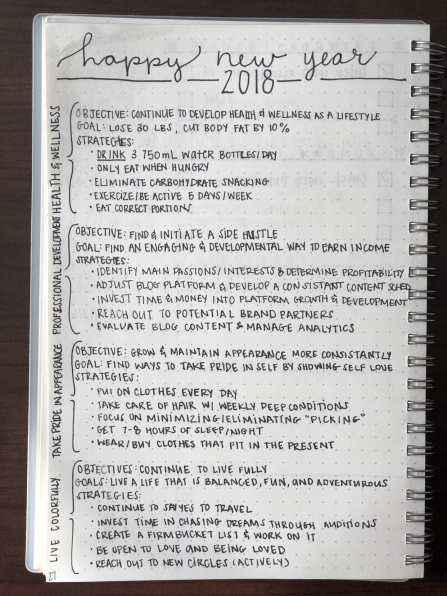January is here, and everyone is busy becoming their new selves. No one is stranger to the annual tradition of setting New Years Resolutions and not sticking to them, only to half-heartedly try again the following year. For the past few years, I have been trying to break down the New Year Resolution break down and evaluate the best way to set and maintain those New Years goals. I have found that I fail at keeping New Years resolutions for three main reasons:
Last year was my first year writing down my goals, pen-to-paper style. I bought a bullet journal, wrote down my list of goals for 2017, and gave it my best shot. I didn’t necessarily track any of my goals, but I would refer back to them every month or so to see what I had yet to accomplish. My list of New Years Resolutions was little more than a year-long “to-do” list. However, even with this half-assed attempt at goal setting, I managed to check off a big chunk of my goals or get close to meeting them. When I finally wrote down my goals, I started to realize that, perhaps, setting New Years Resolutions is a lot more like setting goals in the business world than I initially considered.
If four years of business school and few more years working in corporate America has taught me anything, it is that goal setting is 1) best done with specific, measurable goals and achievements, 2) most successful when there is a habit of accountability, 3) a constant and reoccurring evaluation over a period of time. When considered in the context of New Years Resolutions, I learned that my New Years Resolutions likely failed because I was merely writing a wish list. I wasn’t actually committed to making any changes. Or, if I was committed to making changes, I was too overwhelmed by the number of changes to be made to create a strong action plan to make sure they happen.
This year, when contemplating my goals for the New Year, I decided to borrow a framework from my professional life, and but it in my personal life: the OGSP.
OGSP stands for Objective, Goal, Strategies, and Plans. This framework is not specific to where I work, but if this is new to you, here’s a great, simple resource for you!
With this new idea in mind, I created my goals for 2018 in the spirit of the OGSP. While the traditional OGSP has one specific objective, with measurable goal targets, I am using an modified version of the framework for personal goal tracking. I created 4 separate objectives, each with it’s own goal and strategies, and eliminated the “Plans” element, as I am the only person working on my goals.

Above is a snapshot of my bullet journal, final as of this morning. Instead of a laundry list of things to do, which sounds tedious, very adult, and not very fun, I’m viewing my resolutions as missions- larger objectives with mini goals along the way. In addition to reformatting my goals in this way, I will be tracking my progress for relevant strategies both weekly and monthly in my bujo, just to keep enforcing that accountability!
When you are setting your goals, be it for the New Year or any other time for that matter, the keys to goal setting are below:
- Only set 3-5 larger goals for yourself and prioritize those goals. People tend to be the most focused and productive when they have a limited number of goals to accomplish. They are also able to accomplish those goals more quickly, than if they initially have 6-10 goals.
- Set a numerical target when applicable. Whether its weight-loss, financial freedom, or exploring your city on the regular, if you can put a number target on it, your goal becomes more tangible and realistic, especially if your goal may be harder to reach. For example, “Save more money” is not as strong as “Save an additional $3,000 in 2018.”
- Review strategies frequently, and reevaluate if necessary. If something you are doing is not working, then you might want to change up your strategy. Part of achieving goals is knowing what behaviors are leading to results.
- Be honest with yourself about your progress. Goals are supposed to be ambitious, but it is hard to achieve those goals with you are not honest with yourself about your starting position. Take the time to fully evaluate if you are actually good at managing your disposable income before you skip over setting a financial goal.
I am so excited to try out the OGSP in my personal life! While I have definitely taken some liberties with the framework, the key is that I am going into 2018 ready to take on life.
What goals did you set for 2018?
Advertisements Share this:




